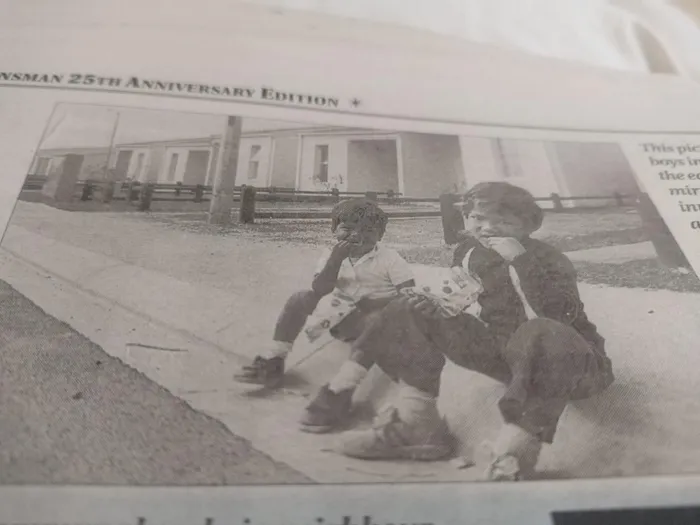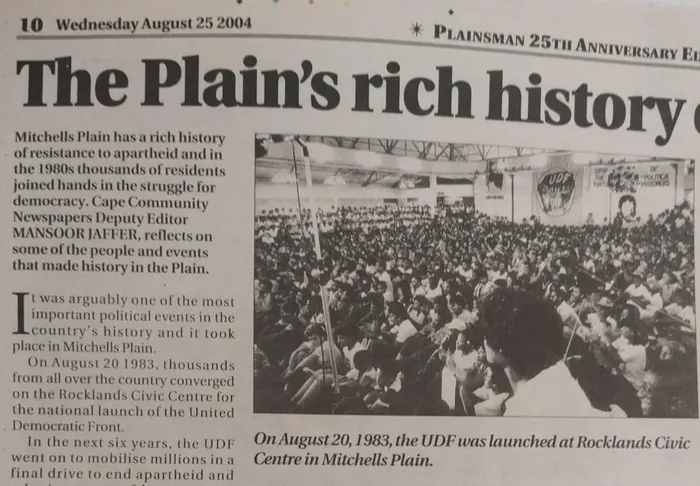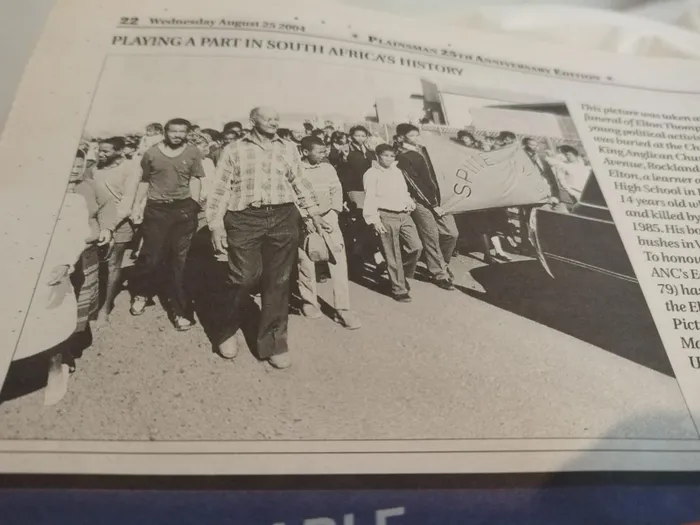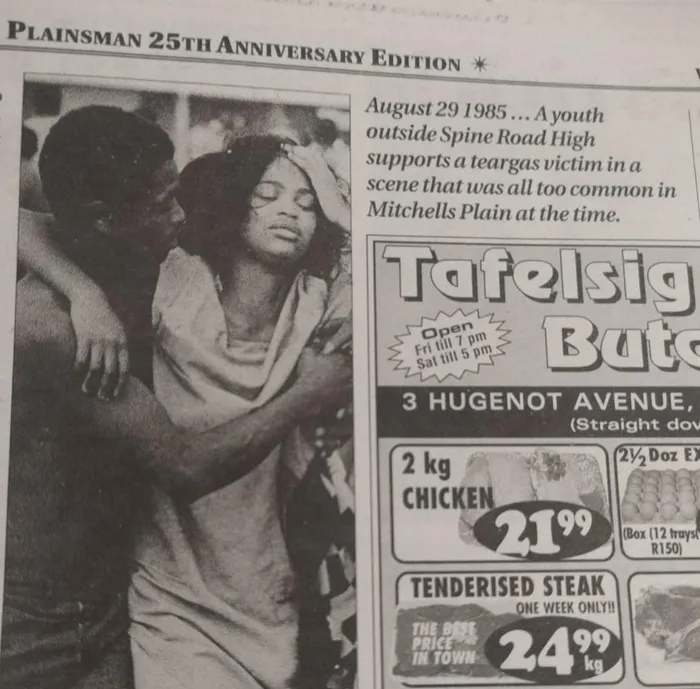Mitchell's Plain: The heart of resistance against apartheid

This picture of two boys in Rocklands in the early years mirrors the innocence and almost child-like excitement residents had when they moved into Mitchell's Plain.
Image: File
When Charnelle Hess, 59, first moved to Rocklands with her parents and six brothers in 1980, she was only 14 years old.
Her family was one of four others who first moved into their Finch Street homes.
“We moved into our new house in December 1980. There was a lot of sand everywhere. We were four families from Ravensmead who all moved into our street on the same day. My grandmother moved into the house next to us,” Ms Hess said.
In stark contrast to the bustling suburb with many schools and shops Mitchell’s Plain is today, schools and businesses were few and far apart.
“We had to adapt to life in Rocklands. Weltevreden Primary, which later became Mitchell’s Plain School of Skills, was not built yet. My father had to take me to school in Ravensmead.
“There were no malls or any of the tuck shops that we have today. I remember the mobile shop coming around, as well as the milkman who regularly came to deliver milk. Even the vegetable vendors came around to our house to sell their fruit and vegetables.
“The only shop was in Westridge: a Spar, near Westridge High. Every Saturday, my mom went to Ravensmead to do our shopping,” she said.
Ms Hess said there weren’t many places of worship in Rocklands back then either. “We attended the Christ the Redeemer Anglican Church in Westridge.
“When the churches and schools started being built, we were excited to see our place being transformed.
“When the Town Centre eventually opened, my mom worked at the OK store in 1981. She didn’t work there for long and passed away in that same year. I turned 15 that year, and after her death, I had to leave school and find a job at a young age.
Looking back on her family’s early years in Rocklands, Ms Hess said Mitchell’s Plain was much safer back then.
“We could walk around visiting friends late at night. I recall even walking to Woodlands to visit friends for a braai. They lived near Princeton High, and we would walk back home again,” she said.

In 2004, Mansoor Jaffer, then Cape Community Media's deputy edtor, reflected on Mitchell's Plain rich political history of the 1980s. His article appeared in the Plainsman's 25th anniversary edition on Wednesday, August 25, 2004.
Image: File
Fighting for equality and justice
Mitchell’s Plain has a rich history of resistance to Apartheid, and in the 1980s, thousands of residents joined hands in the struggle for democracy.
In 2004, Mansoor Jaffer, then deputy editor of Cape Community Media, reflected on some of the people and events that made history in the Plain.
“It was arguably one of the most important political events in the country’s history, and it took place in Mitchell’s Plain.
On 20 August 1983, thousands from all over the country converged on the Rocklands civic centre for the national launch of the United Democratic Front.
In the next six years, the UDF went on to mobilise millions in a final drive to end apartheid and usher in a new era of democracy.
Many people in Mitchell’s Plain contributed to this struggle. Thousands attended rallies and engaged the apartheid police in street battles that resulted in scores injured and others dying.

This picture was taken at the funeral of Elton Thompson, a young political activist, who was buried at Christ the King Anglican Church in Park Avenue, Rocklands, in 1985. Elton, a learner at Spine Road High in Rocklands, was 14 years old when he was shot and killed by the riot police in 1985. His body was found in bushes in Westridge. Picture was courtesy of the Mayibuye Centre at the University of the Western Cape.
Image: File
In the suburbs of the Plain, activists organised the areas’ residents into civic groups, trade unions, youth groups, student bodies, and progressive religious movements.
Johnny Issel, who became an MP in the first democratic provincial parliament, a nationally respected activist in the early days, lived in Rocklands.
Security police dragged him off in the middle of the night on several occasions.
Then there were Rocklands’ Willie and Veronica Simmers, who became stalwarts of the civic movement and UDF and were key to the growth of these sectors in Mitchell’s Plain.
The young lions of the mid-80s took the struggle to new heights, leading militant campaigns at Spine Road, Rocklands, Beacon Hill, Mondale, and several other high schools.
The battles at Spine Road in 1985 made national headlines. Several activists mentioned in this article and scores more, ended up in Victor Verster or Pollsmoor prisons as the PW Botha government intensified its total onslaught.
On the civic front, Shahida Issel, Arthur Jacobs, Lucille Meyer, Neville van der Rheede, Norman Jantjes, and Achmat and Rushda Semaar were prominent.
The Mitchell’s Plain Students Congress was spearheaded by young people such as Kariema Semaar, Errol April, Jeremy Michaels, Gloria Veale, Faiez Jacobs, Mark Jackson and André Bruce (Beacon Hill), Brenda and Estelle Leonard (Rocklands), Walleen and Freda Mostert (Mondale), Salie Hartley (Spine Road), Jacques Baartman (Cedar), the late Siraj Ebrahim (Rocklands and Glendale High), Clinton Davids (Glendale), Christopher Solomons and Oscar van Heerden (Portland),” wrote Mr Jaffer.

29 August 1985 ... A youth outside Spine Road High supports a teargas victim in a scene that was all too common in Mitchell's Plain at the time.
Image: File
Making headlines
On 26 April, 1986, the Plainsman reported that a teacher at Glendale High in Rocklands had been sacked by education authorities for the second time in five months.
Dennis Pillay, 27, who was an English and History teacher, was sacked because he was classified Indian and not cleared to teach at a coloured school.
Pupils at Glendale called for Mr Dennis, who had been teaching at the school for three months, to be reinstated during a placard demonstration (“Teacher sacked because of race”, 26 April, 1986).
Did you know?
- Zackie Achmat of the Treatment Action Campaign was a member of the Rocklands Youth Movement in the 1980s.
- Nelson Mandela visited Glendale High in 1993 to drum up support for the ANC ahead of the country’s first democratic election the following year.
- Houses built in Mitchell's Plain cost between R9 200 and R11 450. Monthly repayments ranged between R58.12 and R66, including the loan subsidy, which meant that home buyers had to earn at least R233 a month to be able to pay for the cheaper houses, and at least R291 for the more expensive houses.
- On the outskirts of Mitchell's Plain and Khayelitsha, the Wolfgat Nature Reserve, which runs along Baden Powell Drive and the False Bay coastline, is a natural jewel wating to be discovered. The reserve earned its name in 1962, when a fossil site of a hyena den dating back 45 000 years was discovered in the cliffs.
- Mitchell’s Plain School of Skills, located on the corners of Weltevreden and Cedars roads, was first a mainstream primary school, called Weltevreden Primary.
- There are eight primary schools, namely Sea View Primary, Caravelle Primary, Hillside Primary, Rocklands Primary, Eisleben Road Primary, Spineview Primary, Wavecrest Primary, and Caradale Primary.
- Rocklands has four high schools, namely Glendale High, Cedar High, Spine Road High and Rocklands High.